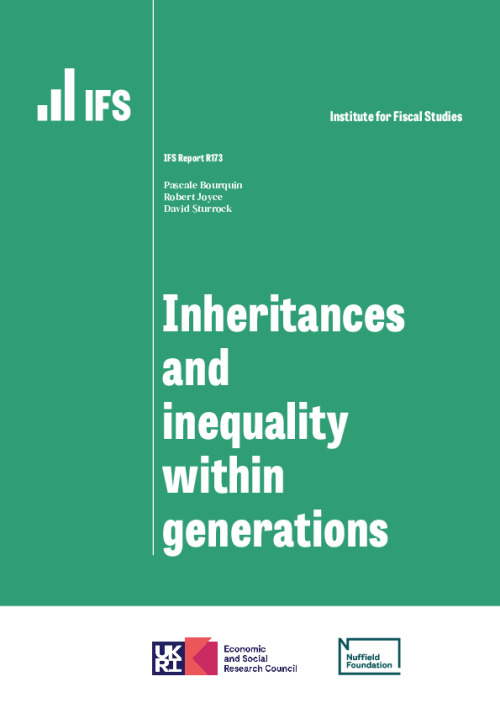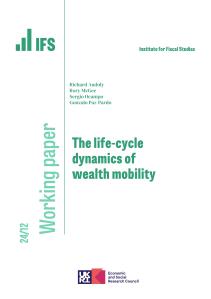This report examines the inheritances that are likely to be received by those living in England who were born in the 1960s, 1970s and 1980s. We explore the age at which inheritances are likely to be received and the amounts that we expect to be inherited, focusing on key inequalities in each. All figures are in 2017–18 prices.
Key findings
On average, people born in each decade since the 1960s have no more wealth than people born a decade earlier had at the same age, but the amount of wealth held by their parents is higher than that of their predecessors. People born in the 1980s have parents with average household wealth of about £370,000. This is over 40% higher in real terms than the £250,000 held on average by the parents of those born in the 1970s, when they were at the same age.
Parental wealth is very unequally distributed. One fifth of people born in the 1980s have parents with wealth ‘per heir’ (i.e. after dividing it equally between their children) of less than £10,000, but 25% have per-heir parental wealth of £300,000 or more and 10% have £530,000 or more.
Education and region are very strong predictors of parental wealth. On average, graduates born in the 1980s have parents with about 70% more wealth than the parents of people born at the same time who have no more than GCSEs. Children of Londoners have parents with over twice as much wealth, on average, as those whose parents live in the North East. Most of that difference is due to higher housing wealth.
The average age of people when their last-surviving parent dies is expected to rise from 58 for those born in the 1960s to 62 for those born in the 1970s and 64 for those born in the 1980s. For about a third of people born in the 1980s, this will not happen until they are in at least their 70s. Of course, this is not necessarily the moment at which all wealth gets passed down, and these trends may themselves lead to more wealth being passed down to children before parents die, or being passed straight down from grandparents. But it seems clear that the natural tendency will be for wealth transfers to occur later and later.
This is driven by the happy news of rising life expectancies across the relevant generations of parents. Within each generation, more highly educated individuals have parents who are likely to live to older ages. However, their parents also tended to have children at an older age, meaning that there will not be large differences in the age of last parental death across the education spectrum.
Higher levels of parental wealth and fewer siblings are expected to result in larger inheritances for those born later. While many things could affect what happens to parents’ wealth between now and when they die – particularly for the youngest generations, for whom we are looking furthest into the future – as an illustration we estimate what people would inherit if their parents accumulate or spend down wealth in a similar way to their predecessors as they age. On that (inevitably uncertain) basis, the median inheritance for those born in the 1980s is expected to be around £136,000, compared with £107,000 for those born in the 1970s and £66,000 for those born in the 1960s.
Inheritances are likely to become larger, not just in absolute terms, but also relative to average lifetime earnings. We project that the median inheritance of the 1960s generation will be worth 8% of average lifetime earnings for that generation, but will rise to 14% of lifetime earnings for the 1980s-born generation. Whereas one in six of those born in the 1960s are projected to receive an inheritance worth more than 10 years of average annual earnings for that generation, this rises to one in three of those born in the 1980s.
Inheritances are expected to reflect the unequal distribution of parental wealth. A fifth of those born in the 1980s are expected to inherit less than £10,000, while a quarter are expected to inherit over £280,000. 1980s-born graduates are expected to inherit almost twice as much, on average, as those born in the same decade who only have GCSE qualifications, though these inheritances represent a very similar proportion of each group’s average lifetime earnings.
The distribution of inheritances is not expected to become more unequal. The amount received by the top 10% of inheritors is expected to rise from over £260,000 to almost £500,000 when comparing those born in the 1960s and those born in the 1980s, an increase of 84%. But the equivalent percentage increase at the 75th percentile is 87%, while the median inheritance is expected to more than double, so inheritances are not expected to grow more at the top than at the middle of the distribution, in percentage terms.
Changes in the size of, and inequality in, inheritances do not by themselves tell us whether inheritances are becoming more or less important for economic inequality. This depends on who receives inheritances, when they receive them, their existing levels of income and wealth, and how inheritances impact these (among other things).
The ongoing health and economic crisis due to COVID-19 makes the outlook more uncertain. This report is based on data and trends from before the crisis. One tragic consequence of the crisis is that many members of the groups we examine will lose, or have lost, their parents earlier than expected. But while the ultimate mortality effects of the virus are not yet known, at the population level this seems unlikely to be the major variable that would affect the conclusions of this report. The indirect effects of COVID-19 through the ongoing economic crisis do, however, have the potential to depress asset price growth and earnings, particularly of younger generations, in the coming years. This could mean less wealth to bequeath if house price growth is depressed or pension values fall. It may also result in lower earnings for those who will receive inheritances, meaning these inheritances become a larger part of their lifetime income. It is possible that those economic effects could have a significant impact on the conclusions of this report – but again, it is too early to say with any confidence.
A podcast featuring authors from this report is available here.











